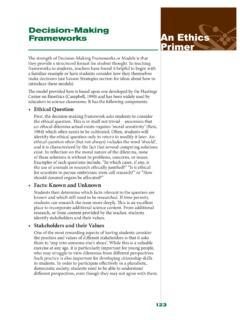Transcription of THE CAUSES OF GLOBALIZATION - University of California ...
1 COMPARATIVE POLITICAL STUDIES / August-September 2000 Garrett / CAUSES OF GLOBALIZATIONThe most important CAUSES of GLOBALIZATION differ among the three major components of interna-tional market integration: trade, multinational production, and international finance. The infor-mation technology revolution has made it very difficult for governments to control cross-bordercapital movements, even if they have political incentives to do so. Governments can still restrictthe multinationalization of production, but they have increasingly chosen to liberalize because ofthe macroeconomic benefits. Although the one-time Ricardian gains from freer trade are clear,whether trade is good for growth in the medium term is less certain. In the case of trade, theincreasing interest of exporters in opening up domestic markets has had a powerful impact on thetrend to liberalization.
2 Cross-national variations in market integration still endure, but these aremore the product of basic economic characteristics (such as country size and level of develop-ment) than political factors (such as regime type or the left-right balance of power).THE CAUSES OF GLOBALIZATIONGEOFFREY GARRETTYale UniversityThere is little disagreementthese days that GLOBALIZATION is changingthe world rapidly, radically, and in ways that may be profoundly dis-equilibrating. But beyond this already trite clich , almost everything elseconcerning the phenomenon is subject to intense debate in the context of anexplosion of interest in and research on the article exploreswhat we know about the CAUSES of GLOBALIZATION . In a follow-up article, I willaddress GLOBALIZATION s consequences for domestic societies (in terms of in-equality and economic insecurity), national autonomy (with respect to regu-lation, spending and taxation, exchange rate regimes, etc.)
3 , and internationalgovernance (International Monetary Fund [IMF], World Trade Organization[WTO], etc.). Throughout, I define GLOBALIZATION somewhat narrowly as the941 AUTHOR S NOTE: Thanks to Stephen Brooks, Michael Dooley, Jeffry Frieden, and RonaldRogowski for helpful discussions on various aspects of this article. I would also like to thankAlexandra Guisinger, Nathan Jensen, Jason Sorens, Andrew Youn, and especially Nancy Brunefor invaluable research POLITICAL STUDIES, Vol. 33 No. 6/7, August/September 2000 941-991 2000 Sage Publications, In 1980, there were fewer than 300 articles or books with the wordglobalorglobalizationin the title. In 1995, the number was over 3,000 (Guillen, in press, Table 2).international integration of markets in goods, services, and capital. Other fac-ets of the phenomenon (such as increased labor mobility and cultural homog-enization) are surely important, but I leave their analysis to examine four contending perspectives on the big picture: What explainsthe rapid pace of international market integration in recent decades?
4 The firstperspective claims that what we are witnessing today is, in fact, nothing newbecause current levels of market integration are only now returning to thosein the last great era of economic internationalization at the turn of the 20thcentury. This view has been accepted as a statement of fact in numerous influ-ential studies (Katzenstein, Keohane, & Krasner, 1998, p. 669; Krasner,1999, pp. 220-223; Rodrik, 1997; Sachs & Warner, 1995). I argue, however,that notwithstanding the aggregate similarities between the two periods, corefeatures of the contemporary world economy are without historical prece-dent. Large-scale portfolio lending to banks in developing countries for pur-poses other than raw material extraction, two-way manufacturing tradebetween the north and south, and complex multinational production regimeswere simply unheard of a century remaining perspectives on global trends debate the CAUSES of thisunprecedented wave of international market integration.
5 The root of the ana-lytic problem lies in the commingling of three secular trends: technologicalinnovations lowering the costs of moving goods and more notably informa-tion around the world, growing international economic activity, and the liber-alization of foreign economic policies. What are the causal relationshipsamong these three trends?The second perspective, technological determinism, contends that theshrinkage of time and space has been so dramatic and so pervasive that thereis essentially nothing that can be done to stop it. According to this view, tech-nological changes have propelled international economic activity, and gov-ernments have been largely irrelevant. Thus, policy liberalization should beunderstood as governments acknowledging the futility of trying to resistglobalization, rather than acting as a prime mover behind market gurus such as Ohmae (1995) have propounded this view, andpolitical scientists such as Rosecrance (1999) and Strange (1998) use it as thestarting point of their case for a technologically determined view of GLOBALIZATION is farstronger with respect to international finance than to multinational produc-tion or trade.
6 In the era of 24-hour global trading in a seemingly limitlessarray of financial instruments, governments can only hope marginally toinfluence control cross-border liquid capital movements. In contrast, though942 COMPARATIVE POLITICAL STUDIES / August-September 20002. See Drezner (1998) and Guillen (in press) for recent reviews of some of these Internet creates novel problems, it remains easier for governments to reg-ulate cross-border movements of physical goods and the buying and sellingof fixed assets. Hence, policy decisions to liberalize trade and foreign directinvestment are likely to have been more consequential for international inte-gration in these third big picture perspective on GLOBALIZATION takes a more moderateview of the effects of technological change. Most mainstream economists(informing the Washington consensus and best-sellers; see Yergin &Stanislaw, 1999) believe that the potential efficiency gains from internationalintegration have increased substantially as a result of technological progressin recent decades.
7 From this perspective, governments can still insulate theircountries from external market forces if they so choose. But the increasedopportunity costs of closure have become sufficiently large to tip the bal-ance in favor of the liberalization of foreign economic policy in country is hard to argue that increasing opportunity costs of closure provide apersuasive account of the GLOBALIZATION of finance. The hypothetical effi-ciency gains of openness seem in practice to be at least offset by the costsassociated with the uncertainty and volatility of international financial mar-kets. At the other end of the spectrum, increasing costs of closure probablyhave been the major motivation for liberalization in the area of foreign directinvestment (FDI). FDI is an important driver of growth. It provides a trans-mission mechanism for the diffusion of technological innovations and lesstangible benefits, such as managerial skills.
8 The trade case is less one hand, there are clearly important one-time gains from trade liberaliza-tion ( , in terms of lowering prices). But modern economic theory isambiguous as to whether freer trade is beneficial for economic growth, andthe empirical evidence is also final big picture perspective on GLOBALIZATION also accepts the criticalrole of government policy, but argues that the phenomenon is essentially apolitical construct that does not improve the economic condition of society asa whole. For example, Rodrik has raised numerous eyebrows among hiseconomist colleagues by claiming that there is no evidence that either freertrade (Rodriguez & Rodrik, 1999) or capital mobility (Rodrik, 1998) is goodfor economic growth. This is grist for the mill of political scientists such asHelleiner (1994), who propose power and ideology explanations of global-ization.
9 On this ideological change view, the roots of contemporary global-ization lay in the neoliberal Reagan/Thatcher revolutions. They were spreadthroughout the developed world by the European Union (EU) and the Bank ofInternational Settlements, and extended to developing counties by the IMFand the World / CAUSES OF GLOBALIZATION943It is easy, however, to endogenize these ideological changes in terms oftechnological determinism in international finance and increased opportu-nity costs of closure with respect to multinational production. In the formercase, there might be domestic political incentives for governments to main-tain restrictions on cross-border capital movements that are futile in an eco-nomic sense. Such policies send negative signals to the financial markets,however, and many governments may be unwilling to take this risk. In termsof foreign direct investment, the fact that multinational firms have becomecritical drivers of technological innovation, learning, and economic growthaffords them a very privileged position (Lindblom, 1977) in domestic pol-icy liberalization, in contrast, has not been technologically determined,and the opportunity costs of closure continue to be debated.
10 Changing prefer-ences and coalitional politics may therefore have played a greater role herethan with respect to international finance or multinational production. Onepossible explanation is that exporters have become much more interested inopening their home markets, mitigating the traditional political bias in favorof protection, because of fears of retaliation against them abroad and becausemany exporters import large portions of the goods they use as inputs in mak-ing finished of international relations and comparative politics may wellobject at this point that my analysis gives short shrift to their central concernsand insights. International political economists have devoted enormousattention to cooperative and institutionalized efforts to reduce barriers tointernational economic exchange among countries. The bread and butter ofcomparative political economy, on the other hand, concerns explaining cross-national differences in economic policies and general response to these objections is that political scientists tend notto explore in sufficient detail the economics of GLOBALIZATION before theymove on to analyzing its politics.













